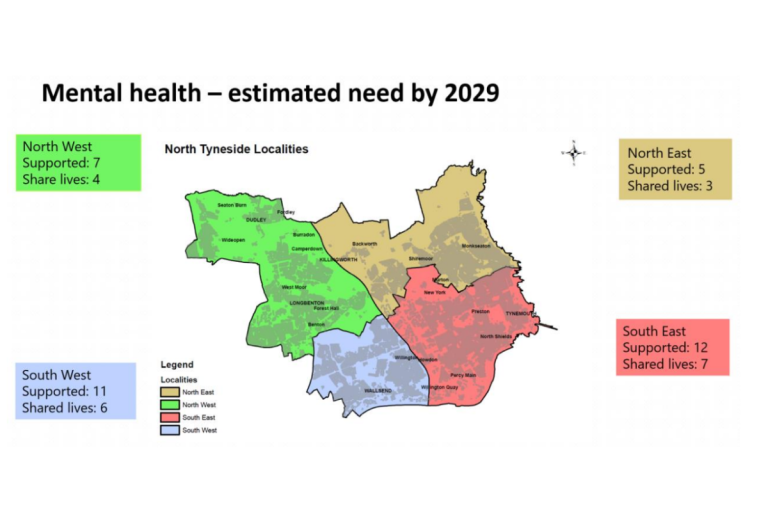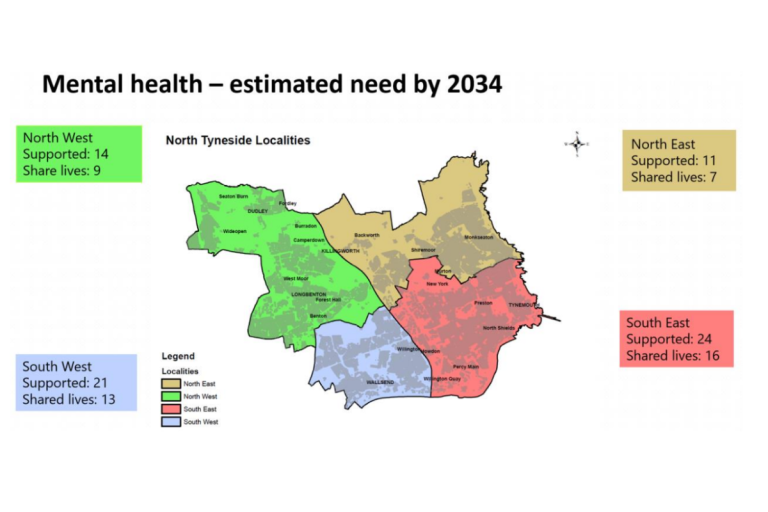Supported and specialist housing for people with mental health needs
7.1 Headlines
- There are currently an estimated 7,665 adults aged 18-64 with mental health needs in North Tyneside, this population is estimated to increase to 8,739 by 2034.
- The majority of people with mental health needs aged 18-64 are living in mainstream housing. A small proportion of people with mental health needs are living in supported housing and in residential/nursing care.
- The Council commissions 39 units of supported housing for people with mental health needs in 4 schemes. 16 of these homes are self-contained housing, the remainder are in shared housing
7.2 What local people are seeking
There is no desire amongst the majority of people with mental health needs to live in residential/nursing care settings.
There is a need for more ‘step-down’ accommodation that supports people to transition from acute hospital settings to supported housing, typically with 24/7 onsite support.
In many cases, people with mental health needs would prefer, and are able to, live in mainstream housing with support.
If supported housing is needed, particularly where complexity of need is high, self-contained accommodation is typically preferred over shared accommodation.
There is a need for supported housing that is designed to be accessible from the outset, to support people to age in place. For example, Oswin Road provides 16 dwellings across 2 buildings, each building containing 8 self-contained apartments. There is evidence that there is an ageing population of people with mental health needs who may also require accessible accommodation.
People are seeking to live in locations with good access to public transport, shops, amenities and support services.
Where people with mental health needs are living successfully independently in the community, they may need ongoing or occasional support from a housing support service in order to maintain a tenancy.
Some people with mental health needs report that the process for finding mainstream housing, both in the private rented sector or through choice-based lettings for access to social housing, is very challenging, which can cause anxiety and stress. Often people need support with this process of finding and securing access to mainstream housing.
7.3 Housing priorities
There is a need to develop an accommodation ‘pathway’ for people with significant mental health needs (who are in contact with/supported by specialist mental health services). This includes having the following mix of housing and types of supported accommodation.
Commissioner experience and knowledge has identified the following commissioning priorities in relation to mental health and housing.
There is no anticipated future need for shared supported housing; in future supported housing should be based on self-contained housing.
There is a need for a small number (c.5 -10 units) of specialist supported housing units for people with complex mental health needs, including 24/7 support, which can also provide ‘step down’ accommodation for people being discharged from inpatient settings.
There is a need for additional small ‘clusters’ of self-contained supported housing that provides short term supported housing, both for people who no longer need 24/7 supported housing and people who need a supportive environment before moving to independent housing.
There is a need for people with significant mental health needs to have better access to mainstream general needs accommodation and to be supported with floating support to enable people to live within the community. This could include expanding community support services; this would enable people to live in mainstream accommodation with support.
There is a need to review the existing range of shared supported housing to assess its quality and suitability as a form of housing that can support people’s recovery. However, it should be noted that shared supported housing will suit some people, particularly in relation to avoiding social isolation.
There is a need to review the needs of people currently in care home placements to assess their suitability for a move to supported housing alternatives (and the specification of the supported housing alternative/s).
Shared Lives may be an option for some people with mental health needs; the intended length of stay is likely to vary depending on a person’s needs.
There has been an over concentration of supported housing in North Shields, Wallsend and Whitley Bay. There is a need to develop supported housing in the north west of North Tyneside.
7.4 Evidence of need and the Council's commissioning intentions
In summary, the requirements and priorities by 2034 are:
- An additional c.35 units of supported housing and c.20 units of Shared Lives accommodation are needed by 2029;
- An additional c.70 units of supported housing and c.45 units of Shared Lives accommodation are needed by 2034.
The map below indicates the estimated need by North Tyneside Locality by 2029 and 2034.


The Council and its NHS partners want to develop a housing ‘pathway’ for people with mental health needs (who are in contact with/supported by specialist mental health services).
The estimated need for supported housing required to 2034 be met by the following ‘components’ of the housing pathway.
Supported housing for people with complex mental health needs. This is typically a small block of flats (c.5-6 units) with 24/7 support, which can provide ‘step down’ accommodation for people being discharged from inpatient settings (as an alternative to ‘bedded care) and/or ‘step up’ in relation to avoidance of admission to inpatient beds. Suggested requirement c.10 units by 2034.
Supported housing for people with complex mental health needs with dual diagnosis related needs. This is likely to be typically a small block of flats (c.5-6 units) with 24/7 support. Suggested requirement c.5 units by 2034.
Supported housing for people with mental health needs with forensic related needs. This is likely to be typically a small group of flats (c.5-6 units) with significant support available (but not necessarily 24/7). For example, the Council has 12 people on its forensic housing listing, that are currently in mental health or secure hospitals, that will need to be accommodated over the next 5 years. Any properties will need to be away from busy throughfares, main roads, but still have access to transport and amenities. The Council will be seeking innovative design and build options, that look to maximise use of alternate heating and green spaces and assisted technology to build confidence and independence. Suggested requirement c.5-10 units by 2029/34.
Additional groups of self-contained supported housing of c.8-10 units, that provide medium term supported housing (for example for up to 2-3 years), both for people who don’t need or who no longer need 24/7 supported housing but who need a supportive environment before moving to independent housing (e.g. daytime support with night security). Suggested requirement c.50 units by 2034.
Consideration of development of Shared Lives places for people with mental health needs; c.45 places by 2034.
